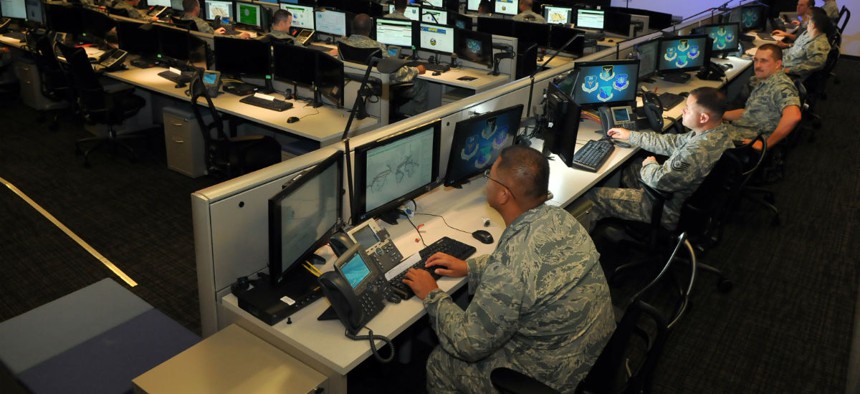Pentagon Watchdog: Cyberspace Fighters Need More Resources To Do Their Jobs

Personnel of the 624th Operations Center, located at Joint Base San Antonio - Lackland, conduct cyber operations in support of the command and control of Air Force network operations and the joint requirements of Air Forces Cyber, the Air Force component U.S. Air Force photo/William Belcher
The Pentagon Inspector General over the past six months has published at least two classified audits on the Cyber Mission Force Teams.
An internal watchdog has suggested that resource constraints are dogging the race to position cadres of hacker warriors across the armed forces.
The Defense Department Office of Inspector General over the past six months has published classified audits on the Cyber Mission Force Teams. U.S. Cyber Command has set a goal of operating 133 such teams at initial capacity departmentwide by 2016. Some of them will attack adversary data systems, many will protect military networks and others will deflect catastrophic hacks targeting the states.
Recently, the inspector general’s website posted a title of one of the audits dated Nov. 24 -- "Cyber Mission Force Teams Need Resources to Perform Missions." Prior to that, the office published a title dated April 30, "U.S. Cyber Command and Military Services Need to Reassess Processes for fielding Cyber Mission Force Teams."
Nextgov has filed requests for each document under the Freedom of Information Act.
Currently, 7 million digital devices touch the military's network, each with the potential to compromise military data or weapons, or to become compromised themselves.
The Pentagon FOIA office on Thursday sent an interim response to the more recent inquiry, saying the office is currently working through a backlog of 800 open cases.
Later that day, an inspector general spokeswoman told Nextgov she didn't have any information on the reason the contents of the audits are restricted. Nextgov has requested comment from Cyber Command.
Within CYBERCOM, some 27 "Combat Mission" teams, 68 "Cyber Protection" teams, and 13 "National Mission" teams are expected to be fully operational by 2018. There also will be 25 "Support" teams to help with analysis and planning.
The command is about halfway done staffing a 6,200-person workforce, Pentagon officials said in September.
This fall, CYBERCOM kicked off a $460 million contract competition for assistance with all command mission activities.
CYBERCOM funding for 2015 is estimated to have dropped by 7 percent, with about $509 million spent this year compared to $546 million last year. In March, Pentagon spokeswoman Lt. Col. Valerie Henderson attributed the dip to one-time 2014 purchases “to fit-out and lease facilities” for the cyber troops.
NEXT STORY: Can U.S. border tech detect fake passports?






